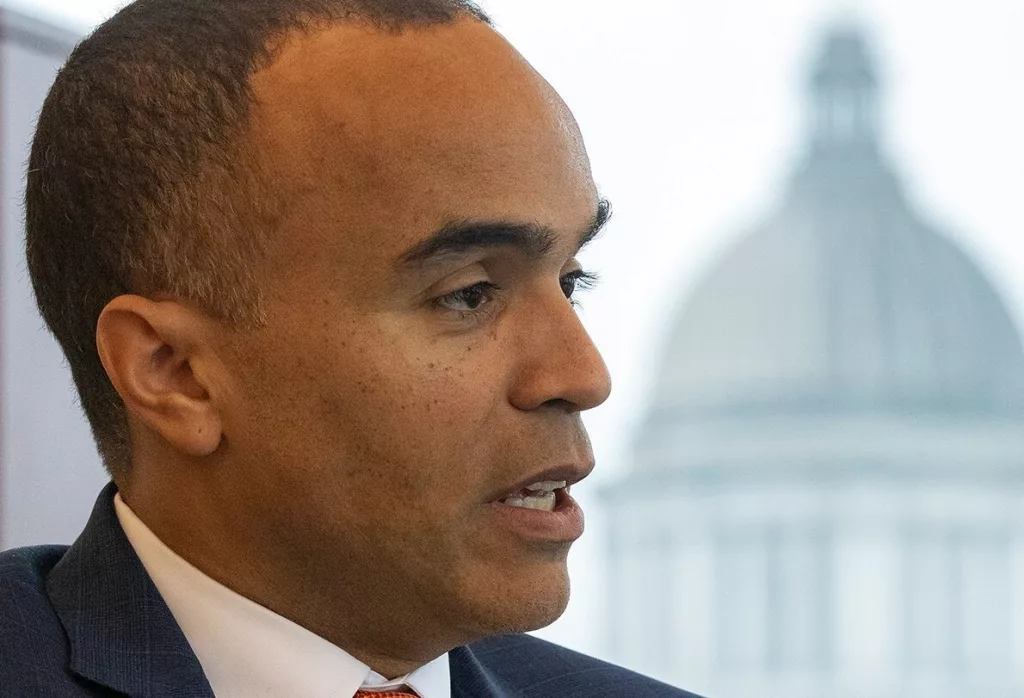OLYMPIA, WA – Washington Attorney General Nick Brown defended state law on how local police must approach federal immigration enforcement in a sharply worded letter to members of Congress this week.
He also justified his lawsuit against an eastern Washington county over alleged violations of that law. The letter to the House Judiciary Committee underscores Washington’s place near the center of Republicans’ crusade against so-called “sanctuary” immigration policies, like the one enshrined in the Keep Washington Working Act passed in 2019.
First-term Republican U.S. Rep. Michael Baumgartner, of eastern Washington, is among those in Congress applying scrutiny to the state law.
“Washington’s sanctuary policies are putting the safety of its residents at risk by prioritizing criminal aliens over law-abiding citizens,” Baumgartner said in a recent statement. “It’s time for Washington to rethink these dangerous policies and put its communities first.”
Brown said that instead of pressuring his office, Judiciary Committee members should turn their oversight toward the “draconian tactics and disturbing statements” of the Trump administration.
“Our country was founded on the promise of equal justice under law,” Brown wrote. “In America, people should not be afraid of their government.”
Brown’s missive came in response to a letter from three Republican members of the House Judiciary Committee: Chairman Jim Jordan, of Ohio, Rep. Tom McClintock, of California, and Baumgartner.
“The state of Washington not only actively thwarts federal immigration enforcement, but it also targets local law enforcement officials for complying with federal law,” they wrote late last month. “Although you claim to serve the people of Washington, your office appears to prioritize the needs of criminal illegal aliens over Washingtonians.”
Brown called these claims “plainly wrong.”
The state law “reflects our Legislature’s judgment that local police should not use their time or resources to assist in immigration enforcement, unless federal law expressly requires it, or in situations where public safety is directly implicated. Contrary to the Committee’s claims, the law does not interfere with federal immigration law,” he retorted.
The law stops local police from helping federal authorities with immigration enforcement. For example, police can’t provide nonpublic personal information to federal authorities investigating civil immigration cases, and can’t interview or detain people solely based on questions about their immigration status.
Police also aren’t allowed to ask about their immigration status except in rare cases.
“In Washington,” Brown wrote, “we know the community is not well served when people become frightened to report crime or to cooperate as witnesses because they fear that they or a family member may be deported if they contact the police.”
President Donald Trump has threatened to withhold federal funding from cities and states with similar statutes that refuse to aid in his vision of a mass deportation campaign. His Department of Justice has sued Illinois and New York over their sanctuary policies.
Some local governments, including the city of Seattle, have shot back with litigation of their own over the funding threats.
Last month, the attorney general’s office accused the Adams County Sheriff’s Office of aiding federal immigration agents for years, by unlawfully jailing people based solely on immigration status, enabling federal immigration agents to question those in custody and sharing personal information on hundreds of Washingtonians with federal officials.
Baumgartner’s district includes part of Adams County, home to about 20,000 residents.
Brown appeared confused why Congress would be so interested in his lawsuit against the county, which has retained lawyers from a law firm founded by top Trump aide Stephen Miller.
“It is unclear how a single lawsuit, filed in state court, alleging a violation of state law, is of such national prominence as to fall within the Committee’s federal investigative jurisdiction,” he wrote. “But we take seriously the role of Congress to provide effective oversight on behalf of the American people.”
The trio of congressmen asked for documentation of investigations into local law enforcement in Washington for their cooperation with immigration officials, as well as the number of declined federal requests to continue to detain people beyond their release date so immigration officers can take custody.
They also requested the cost of the investigation into the Adams County Sheriff’s Office.
Brown either declined to produce the documents because they were privileged or his office didn’t have them. He also said the cost of the Adams County investigation “is not readily available,” adding that the litigation is paid for via settlements and penalties the attorney general’s office won in court cases last year.
Adams County Sheriff Dale Wagner testified before Congress last week, with an introduction from Baumgartner.
“This lawsuit is not about justice or protecting communities,” Wagner said. “It’s about enforcing a political agenda that restricts law enforcement’s ability to cooperate with federal authorities.”
And in an interview with The New York Times, the sheriff said he was within his authority to provide information about inmates to federal authorities.
Farming drives the economy of Adams County, in southeast Washington and, in turn, attracts workers without legal immigration status.
Washington State Standard is part of States Newsroom, a nonprofit news network supported by grants and a coalition of donors as a 501c(3) public charity. Washington State Standard maintains editorial independence. Contact Editor Bill Lucia for questions: info@washingtonstatestandard.com.
